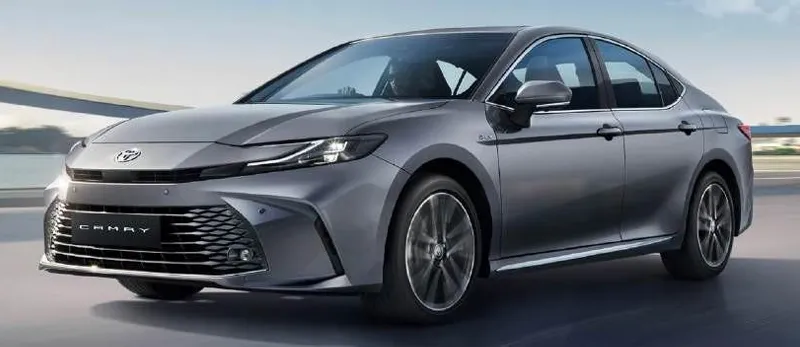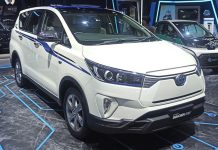The automotive landscape is witnessing a dramatic shift towards greener vehicles, with electric and hybrid cars becoming increasingly popular. Among the contenders in this evolving segment, the Toyota Camry stands out as a unique player. Toyota’s latest release, the 2024 Toyota Camry Hybrid, introduces an innovative and practical solution for environmentally-conscious buyers. Positioned strategically in the middle of two major electric vehicles (EVs), the Camry enters the market with a fresh approach. But does it have enough firepower to challenge its all-electric rivals, the Hyundai Ioniq 5 and the BYD Seal? Let’s dive deeper into the details and assess what the Camry brings to the table.

The New-Generation Toyota Camry Hybrid: Setting the Stage for a Green Future
Toyota’s long-standing commitment to sustainability and hybrid technology has resulted in the 2024 Toyota Camry Hybrid, which boasts cutting-edge features, impressive fuel efficiency, and an eco-friendly design. The Camry Hybrid joins a select group of hybrid vehicles available in India, giving potential buyers a choice between battery-electric vehicles (BEVs) and hybrids.
A Hybrid at Heart: The Camry’s Position in the EV Segment
At first glance, comparing the Toyota Camry Hybrid to its electric counterparts—Hyundai Ioniq 5 and BYD Seal—may seem like an uneven battle. After all, one is a hybrid, while the others are fully electric. However, when considering the price point and the growing popularity of hybrid options, the Camry Hybrid holds its own.
For an Ex-showroom price of approximately ₹50 lakh, the Toyota Camry Hybrid competes with premium electric vehicles like the Hyundai Ioniq 5 and the BYD Seal in their respective top trims. While both the Ioniq 5 and Seal are all-electric, the Toyota Camry Hybrid offers a compelling alternative for those who may have concerns about range anxiety that often accompanies fully electric vehicles.
The Range Game: Toyota Camry Hybrid vs. Hyundai Ioniq 5 and BYD Seal
One of the primary factors consumers consider when purchasing a hybrid or electric vehicle is the range. The Camry Hybrid, with its innovative hybrid technology, provides an impressive 1,275 km range—substantially higher than the range offered by both the Ioniq 5 and the BYD Seal.
- Hyundai Ioniq 5: This RWD electric vehicle boasts a range of 631 km, making it suitable for daily commutes and longer trips.
- BYD Seal: The Seal pushes the boundaries with a range of 650 km, making it a strong competitor in the EV space.
However, while the Camry Hybrid offers a longer range, it is essential to note that the Camry has less power than its all-electric counterparts. The Camry’s 2.5-liter hybrid petrol engine delivers a modest 134bhp and 208Nm of torque. In contrast, the Hyundai Ioniq 5 generates a robust 215bhp and 350Nm, while the BYD Seal takes the crown with an impressive 308bhp and 360Nm of torque.
The Power Battle: Performance Comparison
While the Toyota Camry Hybrid excels in fuel efficiency and range, it lags behind the Ioniq 5 and Seal in terms of power. The Camry Hybrid’s 2.5-liter hybrid petrol engine delivers sufficient power for most daily driving needs, but it is no match for the raw power offered by the Ioniq 5 and BYD Seal.
- Hyundai Ioniq 5: The Ioniq 5 features a powerful electric motor, generating 215bhp and 350Nm of torque, making it more dynamic and responsive on the road.
- BYD Seal: The BYD Seal is the most powerful option among the three, producing 308bhp and 360Nm of torque, which gives it a thrilling performance edge over the Camry Hybrid.
However, the Camry Hybrid’s performance is still robust for a hybrid vehicle, and its range advantage compensates for the lower power output.
Dimensions and Platform Differences
When it comes to dimensions, the Toyota Camry Hybrid is the longest car of the trio. However, it has the smallest wheelbase, which is typical for a traditional Internal Combustion Engine (ICE) vehicle. On the other hand, both the Hyundai Ioniq 5 and BYD Seal are built on a skateboard platform, which allows for a more spacious interior with a longer wheelbase, despite the vehicles having a smaller overall length.
This design difference impacts interior space and overall comfort. The Ioniq 5 and Seal benefit from the increased cabin room, thanks to their longer wheelbases, making them more accommodating for passengers.
Features Comparison: Toyota Camry vs. Hyundai Ioniq 5 vs. BYD Seal
When it comes to features, the Toyota Camry Hybrid, Hyundai Ioniq 5, and BYD Seal are fairly evenly matched. Each vehicle comes equipped with advanced tech and comfort features that cater to modern-day consumers.
Toyota Camry Hybrid Features:
- Dual digital screens
- Multi-zone climate control
- LED light package
- Powered front seats
- 360-degree camera
- Level 2 Advanced Driver Assistance System (ADAS)
- Nine airbags for enhanced safety
- Powered second-row seats with media controls
Hyundai Ioniq 5 Features:
- Dual digital displays
- Multi-zone climate control
- LED lighting
- Advanced safety tech with ADAS
- Six airbags for safety
BYD Seal Features:
- Dual digital screens
- Multi-zone climate control
- Advanced safety features
- Eight airbags
The Toyota Camry Hybrid edges ahead with the additional luxury of powered second-row seats, appealing to the chauffeur-driven market. Furthermore, its nine airbags provide superior safety compared to the Ioniq 5 and Seal.
Toyota Camry Hybrid: The Ultimate Hybrid Solution?
While the Hyundai Ioniq 5 and BYD Seal may excel in raw power and electric performance, the Toyota Camry Hybrid offers a more balanced approach for those seeking the convenience of a hybrid system. The Camry provides a longer range, excellent features, and a strong safety package, making it a compelling option in the hybrid market.
The Ioniq 5 may have the edge in terms of its all-electric nature and spacious design, while the BYD Seal offers superior power and sportiness. However, the Toyota Camry Hybrid stands as a practical and well-rounded vehicle for consumers looking for the best of both worlds—hybrid efficiency and a no-compromise driving experience.
Conclusion: Is the Toyota Camry Hybrid Worth It?
The 2024 Toyota Camry Hybrid enters the EV and hybrid market with a strong offering. While it may not compete with the Hyundai Ioniq 5 or BYD Seal in terms of raw power, it compensates with its range, advanced features, and eco-friendly hybrid technology. As the automotive industry moves towards more sustainable solutions, the Camry Hybrid serves as an attractive option for those looking for a practical yet efficient vehicle.
FAQs about the 2024 Toyota Camry Hybrid
1. What is the price of the 2024 Toyota Camry Hybrid in India?
The Toyota Camry Hybrid is priced at approximately ₹50 lakh (Ex-showroom).
2. What is the range of the Toyota Camry Hybrid?
The Toyota Camry Hybrid offers an impressive 1,275 km range, making it a strong contender in the hybrid market.
3. How does the Toyota Camry Hybrid compare to the Hyundai Ioniq 5?
The Camry Hybrid offers a longer range than the Ioniq 5 but has less power. The Ioniq 5 is a fully electric vehicle with a range of 631 km.
4. What are the safety features of the Toyota Camry Hybrid?
The Toyota Camry Hybrid comes with nine airbags, Level 2 ADAS, and a 360-degree camera, ensuring a high level of safety.
5. Is the Toyota Camry Hybrid suitable for long drives?
Yes, with its hybrid engine and impressive range, the Toyota Camry Hybrid is an excellent choice for long drives without worrying about range anxiety.




